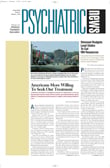Panelists at the keynote session, “Assess Options for Making Drugs More Affordable,” of the Sixth Annual Congress on Medicaid and Medicare agreed on only one point: new ways must be found to make prescription drugs affordable.
According to the National Managed Health Care Congress (NMHCC), which sponsored the meeting last month in Washington, D.C., more than 40 states took steps last year to reduce escalating drug prices for the elderly, the uninsured, or Medicaid beneficiaries (Psychiatric News, January 18).
The panelists, who collectively represented state and federal governments and Congress, took sharply different positions about how to enable more people to benefit from the increased availability of effective prescription drugs.
Administration Pushes M+C
Jennifer Boulanger, acting director of health plans at the Centers for Medicaid and Medicare Services (CMS), said, “The administration is committed to a drug benefit in Medicare.”
Boulanger described two approaches, which she called “short-term strategies,” to increase access to drugs. Medicare+Choice (M+C), the Medicare managed care option, is “the fastest growing source for prescription drugs” and is also the basis for the administration’s attempts to reform Medicare, according to Boulanger. She acknowledged, however, that the number of Medicare beneficiaries with access to an M+C program is declining and that benefits in those programs “particularly with respect to prescription drugs” are decreasing.
The second strategy is a Medicare-endorsed discount card program for prescription drugs. That program was announced last summer but has not yet been implemented. It would “use the organized purchasing power of millions of seniors and disabled Americans to move market share and lower the cost of prescription drugs,” said Boulanger. She predicted that beneficiaries would get discounts averaging 10 percent to 13 percent on drugs through use of the card.
Senators Propose Legislation
Lisa Layman, senior policy advisor to Senator Bob Graham (D-Fla.), described provisions of the Medicare Prescription Drug Benefit Act (S 1135), which was introduced by Graham and 10 cosponsors last June and has been referred to the Senate Finance Committee.
In 1999, she noted, 75 percent of the M+C plans that offered drug benefits limited coverage to $1,000. S 1135 would offer a “standard prescription drug benefit as part of the Medicare program.”
Medicare would contribute 50 percent of the cost of each prescription above the deductible of $250 and would also contribute 50 percent of the cost of premiums for most beneficiaries. After $4,000 in out-of-pocket expenditures, Medicare would pay any remaining expenses.
The program would be administered by the use of multiple competing pharmaceutical benefits managers (PBMs). Layman said, “We do not believe that the private sector should bear the insurance or the selection risk of a Medicare coverage benefit” because those companies might avoid signing up the beneficiaries most in need of prescription drugs. In a matter yet to be determined, the PBMs would be held accountable for the prices and mix of drugs and their skill at negotiating discounts and rebates.
Maine Demands Rebates
Panelist Kevin W. Concannon, commissioner of Maine’s Department of Human Services, said, “States have been very passive for many, many years [concerning] the cost of prescription drugs,” but change is coming about because of the increasing percentage of states’ budgets allocated to those drugs.
Maine has two major initiatives concerning prescription drugs, both of which are under legal challenge by the Pharmaceutical Research and Manufacturers of America (PhRMA).
Healthy Maine Prescriptions is made possible through a Section 1115 Medicaid waiver that provides a single-purpose benefit extension. Through the program, any Maine resident is eligible for the Medicaid discount on prescription drugs as long as he or she has an income that does not exceed 300 percent of the poverty level. For example, a family of four with a monthly income of $4,413 is eligible for the program and receives a discount of approximately 25 percent on prescription drugs.
PhRMA filed suit, alleging that the Department of Health and Human Services (HHS) does not have the legal authority to grant a single-purpose Medicaid benefit extension. The legality of the program was upheld through several rulings and has been appealed by PhRMA to the United States Court of Appeals in the District of Columbia.
The second of the two programs, Maine Rx, was passed by the state legislature in May 2000, but implementation has been delayed by legal challenges.
Maine Rx authorizes Maine’s commissioner of health services to negotiate rebates and discounts on prescription drugs for uninsured residents, establish maximum prices for prescription drugs if significant discounts and rebates are not negotiated by 2003, and require prior authorization under the Medicaid program if a prescription drug is not offered at lower prices.
According to the statute, a manufacturer or distributor of prescription drugs who charges an excessive price for prescription drugs or who restricts the supply of prescription drugs in the state may be assessed a civil penalty of up to $100,000 for each action.
In October 2000, PhRMA successfully challenged the program in the U.S. District Court for Maine based on constitutional grounds, including violations of the interstate commerce clause.
Maine appealed to the First Circuit Court of Appeals in Boston. The Court of Appeals ruled in the state’s favor, saying that the program does not “regulate” the drug companies’ interstate commerce and that the effect on the drug industry is not excessive in light of the benefits to be obtained.
PhRMA appealed the case to the U.S. Supreme Court, which asked for an opinion from the U.S. Solicitor General on the law’s constitutionality. Concannon told Psychiatric News that he expects that opinion in the near future.
The text of S 1135 is posted at the Web site thomas.loc.gov. Various documents about the Maine initiatives are available at www.state.me.us/dhs. PhRMA’s Web site is www.phrma.org. ▪
